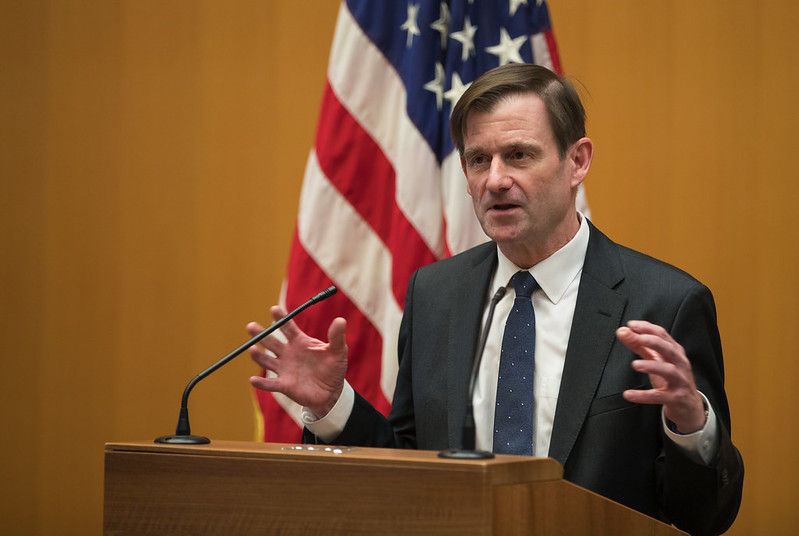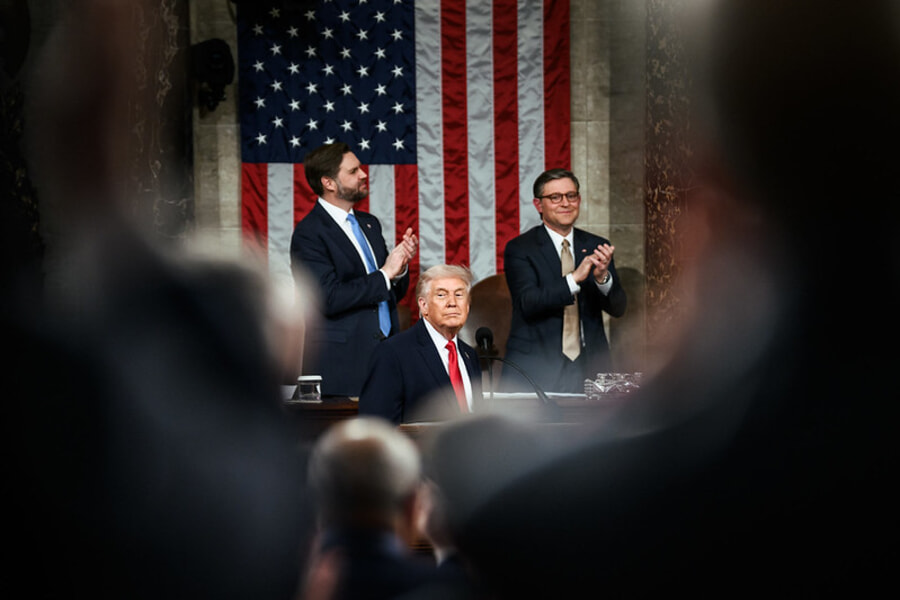The Senate Foreign Relations Committee’s Conflicting Views on the Role of Sanctions in America’s Strategy Toward Russia
The Senate Foreign Relations Committee’s Dec. 3 hearing on the future of the U.S.-Russia relationship revealed stark differences in lawmakers’ views on the role sanctions should play in Washington’s strategy toward Moscow.

On Tuesday, Dec. 3, shortly before the House Intelligence Committee released its majority report on the impeachment inquiry into President Donald Trump, the Senate Foreign Relations Committee gaveled into session a hearing on the future of the U.S.-Russia relationship.
In a saner and more forgiving news cycle, the hearing—which featured testimony from David Hale, the undersecretary of state for political affairs, and Christopher Ford, the assistant secretary of state for international security and nonproliferation—might have drawn significant attention. Senators not only questioned whether America has pursued discrete policy responses to Kremlin aggression at the expense of a broader, more coherent Russia strategy, but also fiercely debated the effectiveness of the primary tool they have used to punish and shape Moscow’s behavior: sanctions.
Senators’ views on sanctions fell broadly into three camps: (a) that the threat of sanctions seems more effective than their ultimate imposition, which is often done without giving the president the power to remove them; (b) that sanctions are overused and are effective only when they advance narrow, well-specified policy ends; and (c) that existing sanctions regimes are useful and underused, as they are being neutered by the administration’s refusal to enforce them consistently and robustly.
Sen. Rand Paul emerged as the most vocal proponent of the first camp, beginning his questioning of the State Department witnesses by rather provocatively asking Hale to identify a single instance in which American-imposed sanctions prompted a change in Russian behavior. While Hale failed to offer such an example, he responded by stating that sanctions have a long-term deterrent effect that is difficult to measure, and he added that the threat of sanctions often has more of an impact than does their affirmative imposition. Paul agreed with the latter point, as did Ford. In his prepared remarks, Ford celebrated the deterrent effect that the threat of imposing sanctions under the Countering America’s Adversaries Through Sanctions Act (CAATSA) has had, terming the phenomenon “CAATSA diplomacy.” Paul argued that, if sanctions are to be imposed, the legislation should allow the president to remove the sanctions if the targeted states or actors change their behavior. Denying the president this power, as Congress does when it passes mandatory sanctions, undermines the ability of sanctions to influence adversaries’ behavior and is rooted in congressional arrogance that “we know better,” the Kentuckian said. Hale agreed that “reversibility” and “flexibility” in sanctions are key for influencing target states’ actions.
Paul turned to the example of Trump’s imposition of sanctions on Turkey in October in an attempt to illustrate his points about the effectiveness of the threat of sanctions, as well as the usefulness of sanctions that the president can reverse quickly. Paul contended that the administration’s levying of sanctions, which Trump could and later did withdraw, coupled with the threat of additional sanctions, led Turkey to “pause” its offensive in northeast Syria. Paul’s example is belied, however, by the numerous reports that Ankara never truly honored that pause. While the failure of these sanctions to meaningfully change Turkish actions might seem to support Paul’s overarching point about the severe limitations of the foreign policy tool, lawmakers in a series of hearings in October seemed to think that the sanctions did not impose sufficient costs on Turkey to deter its aggression or prompt the needed changes in its behavior. Put simply, the administration did not have its heart in the effort and resisted much harsher congressional proposals.
Senate Foreign Relations Committee Chairman James Risch and Sen. Mitt Romney championed the more charitable but still narrow second position that sanctions are overused but can be effective when used with scalpel-like precision. Risch offered the example of the bill Sens. Ted Cruz and Jeanne Shaheen recently co-sponsored, the Protecting Europe’s Energy Security Act of 2019, which sanctions the vessels involved in the construction of Russia’s Nord Stream 2 pipeline in an effort to prevent the imminent completion of the pipeline. Risch nevertheless expressed “serious concerns” about the overuse of sanctions, particularly given that “U.S. financial preeminence” makes them “an easy” tool to turn to, especially “in the absence of a larger strategy.” In short, Risch and Romney worried that “ad hoc sanctions,” imposed in response to Kremlin actions, have begun to stand in for a comprehensive, forward-looking framework for dealing with Russia. Romney went further still, asserting that America needs a strategy akin to George Kennan’s famous doctrine of containment to dissuade Russia from ratcheting up its aggression.
Sen. Bob Menendez, the ranking member on the committee, and Cruz doggedly advanced the third and final position—that existing sanctions regimes offer potent means of countering Russian aggression but are being neutered by the administration’s refusal to enforce them. Menendez led with that point in his opening remarks, noting that, at the time of the hearing, it had been 144 days since Turkey took delivery of the Russian S-400 missile defense system. Turkey’s controversial purchase of the Russian hardware, Menendez said, should have triggered sanctions under CAATSA § 231, the operative language of which requires the president to sanction individuals or entities he determines to have “engage[d] in a significant transaction with a person that is part of, or operates for or on behalf of, the defense or intelligence sectors of the Government of the Russian Federation….” When Menendez pressed Ford, the assistant secretary acknowledged that CAATSA § 231 sanctions are mandatory. And Menendez additionally observed that the administration sanctioned China for its equivalent purchase of the S-400—suggesting that the purchase of the system clearly falls, and indeed has already fallen, under the category of a “significant transaction” under the law—but has yet to sanction Turkey for buying the same system or for brazenly testing an F-16 on it. The administration’s refusal to discharge its statutory obligation to impose sanctions on Ankara, Menendez argued, sends “a global message that, in fact, we’re not serious about uniformly enforcing the sanctions that the Congress passed.”
Ford countered that the administration’s determination of whether to impose CAATSA sanctions is subject to a deliberative process at the State Department that is still under way; he added that Secretary of State Mike Pompeo has made clear his intent to comply with the act. The assistant secretary further explained that the administration sanctioned China not only for purchasing S-400s but also for buying Russian Sukhoi fighters. The deliberative process in the China case—from the time Beijing acquired the Russian systems in January 2018 until the time the administration sanctioned the Chinese military’s Equipment Development Department and its director under CAATSA in September—took around eight months to be completed, a period “rather longer than 144 days,” Ford added. That timeline, in Ford’s words, is the “precedent” here.
Despite his evident frustration, Menendez did not double down on the threat he made at a hearing in October: that he would force the State Department to disclose its legal position on whether Ankara’s purchase of an S-400 constitutes a significant transaction under the law if the department failed to announce its conclusion soon.
Toward the end of the hearing, Cruz joined Menendez in emphasizing the importance of enforcing CAATSA sanctions. Cruz explained that the only reason he and Shaheen introduced their Nord Stream 2 legislation is because the administration has refused to sanction the ships completing the pipeline under CAATSA § 232. That section, which outlines the procedures for “sanctions with respect to the development of pipelines in the Russian Federation,” provides the administration with clear statutory authority to sanction the vessels working feverishly to complete Nord Stream 2—a point Cruz and Menendez both stressed. These sanctions would stop the pipeline’s development, due to be completed next month, in its tracks.
When Cruz pressed Hale to explain why the administration has not yet acted under CAATSA § 232, the ambassador explained that the administration has been using diplomatic tools and a “range of leadership engagements” to try to stop the pipeline. The senator from Texas doubted those efforts stood a “snowball’s chance in hell” of succeeding and noted that he hopes his Nord Stream 2 bill will pass as part of the National Defense Authorization Act, thereby ensuring the sanctions will take effect.
For Menendez, the administration’s failure to impose sanctions under CAATSA reinforced that Congress should give the executive branch less discretion, not more, when crafting sanctions regimes. Cruz’s anger with the administration—and his move to circumvent its refusal to take action under CAATSA by co-sponsoring a Nord Stream 2 bill that he believes to be redundant and already covered by CAATSA—suggests that the senator from Texas quite agrees.





